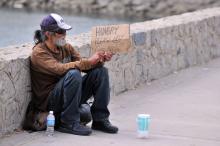Economic Justice

Yesterday, as Congress battled over the future of interest rates on student loans, I was invited to the East Room of the White House to hear President Obama call on Congress to keep college affordable. Upon arrival, I found that most of the invitees were college students 20 years old and younger—at 36, I felt pretty old.
It was like being at a rally at on a college campus. What made it interesting was that Obama was directly speaking to those most affected by this pending Congressional action – college students.
College students who need to borrow for school, on average graduate with more than $25,000 in debt.
On July 1, the federal interest rate for student loans is scheduled to double from 3.4 percent to 6.8 percent unless Congress intervenes. The new rate would affect federally subsidized Stafford loans, which are provided to almost 7.5 million low- and moderate-income students nationwide each year.

When the Nuns on the Bus pulled up in front of Rep. Paul Ryan’s home office in Janesville, Wis., earlier this week, they were challenging the theological rationale he has been using for his budget plan that has become the economic banner for the Republican Party.
But they were also showing how people can hold strong opinions, get those opinions into the public arena and still engage adversaries in respectful ways.
In the process, they called on citizens to get engaged in the same way.
“I urge you, urge you, I beg you, Janesville, in this election cycle, please, don’t be a spectator,” Sr. Simone Campbell pleaded with a crowd in the courthouse park as their visit to the southern Wisconsin city came to an end.

Carolyn Winfrey Gillette wrote this hymn based on Micah 6:8 after attending Bread for the World’s Lobby Day on June 12th and reading Jim Wallis’ “The Missing Religious Principle in Our Budget Debates.”
O God, You Call for Justice
AURELIA 7.6.7.6 D ("The Church's One Foundation")
O God, you call for justice—for goodness, never greed!
You seek a world of fairness where all have what they need—
Where all have food and water and homes in which to thrive,
Where all have hope and laughter and joy to be alive!

A growing number of cities across the United States are making it harder to be homeless.
Philadelphia recently banned outdoor feeding of people in city parks. Denver has begun enforcing a ban on eating and sleeping on property without permission. And this month, lawmakers in Ashland, Ore., will consider strengthening the town's ban on camping and making noise in public.
And the list goes on: Atlanta, Phoenix, San Diego, Los Angeles, Miami, Oklahoma City and more than 50 other cities have previously adopted some kind of anti-camping or anti-food-sharing laws, according to the National Law Center on Homelessness & Poverty.
A group of Catholic Sisters set off for the Nuns on the Bus tour, speaking out against the House Republican budget that cuts funding for safety net programs and hurts those already in poverty.
NETWORK, a Catholic social justice group, is sponsoring the road trip, which departed from Ames, Iowa today.
Salon's Editor-at-Large, Joan Walsh writes:
"Thanks to OWS and the work of writers like Stiglitz, 2012 was supposed to be the year America rediscovered and tackled economic inequality. Time magazine closed 2011 by naming OWS its top story of the year, a pretty big honor for a movement that only revved up in the year’s final quarter. But that’s how much its “We are the 99 percent” framing seemed to change the political debate."
Read her full article here

The video clip may be a bit grainy, but the message of a public service announcement about the federal Equal Pay law from 45 years ago feels thoroughly (and maddeningly) au courant.
Last week marked the 49th anniversary of the passage of the Equal Pay Act of 1963.
The vintage PSA, starring Batgirl (Yvonne Craig), Batman (Adam West), and Robin (Burt Ward) from the 1960s television series Batman, finds the "dynamic duo" in a familiar kerfuffle — tied to a chair in a "deserted warehouse on the outskirts of town" with a bomb ticking just out of reach.
BAM! Batgirl bursts through a door just in time to rescue them before the bomb goes off. But ... not so fast, fellas. First, Batgirl, resplendent in her purple body suit and mask, has a bone to pick with her male colleagues.
A fascinating essay on 'geo-economics' for The Atlantic by Ayesha and Parag Khanna:
Still, technology is playing a great role in not just the events of geopolitical history but its course. If military power is inherently competitive -- the stronger your army and the weaker your neighbor's, the more powerful you become -- then economic power is more cooperative. After all, much of America's power today is economic, but that power would decrease if China's economy collapses. Technological power is also cooperative in this way, perhaps even more so.
Read more here
A record number of teens will be able to find work this summer, The Associated Press reports:
Once a rite of passage to adulthood, summer jobs for teens are disappearing.

As Congress continues to wage a war of political ideology over budget cuts and entitlement programs, they need to remember that these abstract policy debates have real consequences for millions of Americans.
Deciding between funding programs that feed the hungriest Americans versus giving tax breaks for the wealthiest Americans is not really a choice, at least not when it comes to the demands of the Gospel.

I want to tell you the story of one brave woman who has given her life to live in the East Garfield Park neighborhood of Chicago.
Arloa Sutter is one of my new heroes. Let me tell you why.
I met Arloa through the Redbud Writers Guild to which we both belong. Last month I had the honor of meeting her at our guild retreat. I had no idea what a culture rebel she was.
Arloa didn't begin her days of serving the inner-city poor as the grandmother she is today, but as a young woman. It all began with her church staff not knowing what to do with the many people who came into the building during the week needing assistance. Instead of pushing them out the door, she created a storefront room that provided food,l friendly conversation and a hot cup of coffee to those wishing to escape the cold. This eventually evolved into her gathering a board of directors to form Breakthrough Ministries in 1992.
She didn’t know what she was doing, but she did it anyways. I love gutsy people like that.

When I walk into Paola's first-grade classroom, I'm aware of her poverty. Nine out of 10 of the students at our school meet the federal poverty level guidelines. She is one of them.
She lives in a small apartment with her grandma, mom, sister and uncle; they make less than $26,170 a year.
As the Nobel Prize-winning economist Paul Krugman reminds us, she is all too likely to suffer from poor nutrition, inadequate health care, an inferior education and a bad future.
I'm struggling against her life-crushing poverty with all of the compassion, creativity and commitment within me.
Yes, I'm aware of her poverty. Today, however, I don't see it.
From investigative-journalism nonprofit Remapping Debate:
"When the recession hit, state revenues — made up primarily of sales and income taxes — declined dramatically, prompting deep cuts to state services. In at least 30 states, funding for K-12 education was lower in fiscal year 2012 than in 2008, despite growing student populations. States have also made deep cuts in health care programs and in higher education funding. State aid to local governments has declined, and state and local governments have shed more than 500,000 jobs since the beginning of 2009.
In state after state, politicians justified the large budget cuts on the grounds that the condition of the state budget made it temporarily necessary to reduce services. ..."
Now income and sales taxes are bouncing back, and at least 25 states are likely to be running a surplus for the fiscal year ending in June. But
"... instead of either restoring cuts in state services or increasing aid to local governments and school districts, several state legislatures are choosing to use their surpluses to cut taxes. Besides Kansas, at least seven other states have passed bills that cut taxes and reduce revenue in future years, and several more are still considering doing so."
Read the full investigative article here.

There have been lots of news stories lately about student loan forgiveness and the like, and as the holder of serious five-figure graduate student loans, you’d think I’d follow the discussion closely.
But to be honest, I haven’t paid much attention for one, possibly cynical, reason; the systems isn’t going to change.
I joke sometimes that my dream is to pay off my student loans before I retire, but to be honest, that probably won’t happen. It wouldn’t surprise me if I have them with me the rest of my life.
I know, typical twenty-first-century young adult nihilism, right? Maybe. But my monthly payments are already the second largest bill we have next to our mortgage. Still, the payback time line spans many, many decades. I’d like to believe that those in power have the necessary motivation to change things, but here’s why I hold little, if any, hope they ever will.
David Horsey writes in the Los Angeles Times:
"The best thing that can happen is that one party or the other wins both the presidency and control of Congress in the November election. It may have made sense in a more civil era, but divided government no longer works; the divide is simply too great. We desperately need a coherent national economic policy, and even a flawed one that is fully implemented may be better than one that is permanently stalled."
Read more here
Writing for The Huffington Post. Jeffrey P. Colin argues:
"With election campaigning in full swing now, many of the us from the 99% made famous by the Occupy Wall Street protests, are concerned that neither candidate is paying adequate attention to the issue of poverty. We are concerned that, while much is being made of impending debt ceiling debates, and geopolitics, the plight of a large percentage of the people living in the American heartland is being almost completely ignored."
Read his article and answer his poll here
Writing for The Daily Beast today, Joel Kotkin argues:
The developed world’s youth shouldn’t expect much help from an older generation that has preserved its generous arrangements at the cost of increasingly stark prospects for its own progeny. Instead the emerging generation needs to push its own new agenda for economic growth and expanded opportunity.
Read more here
For The Huffington Post, Robert Gallucci writes:
Around the world, 35 million girls who should be in primary or secondary school are not; half of them are in sub-Saharan Africa, according to the World Bank. For those of us committed to addressing global poverty, improving education for girls may be the closest thing to a silver bullet.
Read the full piece here
John Hudson of The Atlantic writes:
"Everyone agrees the latest jobs report is a disaster, but economists are split about the underlying cause. Did increased gas prices choke off employment? Did uncertainty in Europe? How about job cuts in the public sector?"
Learn more here